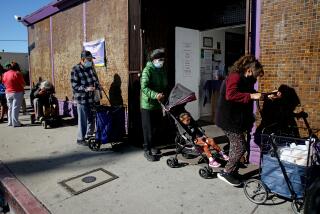Editorial: If the homeless can’t have their tiny houses, what can they have?
- Share via
When Los Angeles city sanitation workers hauled away three so-called tiny houses — brightly painted wooden structures the size of garden sheds — from a South LA sidewalk like bulky trash, the action understandably caused an outcry. Despite their size and the absence of such basic amenities as plumbing and heating, the solar-powered houses had been quickly embraced by homeless people as an alternative to sleeping in a shelter or on a street. Another eight structures were taken away by the builder, who’d raised money for the project from like minded donors sympathetic to the plight of homeless people. The endeavor seemed enterprising and came at no direct cost to a city struggling to house more than 25,000 homeless people in a county with 44,000 homeless.
Of course, it wasn’t quite that simple. Curren Price, the city councilman whose district held the cluster of houses, contended that they blocked the public right-of-way, dumped trash in the streets, harbored drug activity and were generally an unsafe presence. “We don’t need temporary, Band-Aid solutions, we need a permanent fix,” he wrote in the Los Angeles Sentinel.
That’s exactly what the city and county need: a fix to the crisis of homelessness that provides permanent housing and supportive services. No one would disagree with that. And the city and the county have ambitious plans to house the 44,000 homeless people in the county. But those plans, approved just last month, will cost hundreds of millions of dollars and years of study and review to implement. (The city’s plan estimates that Los Angeles needs $1.85 billion in new housing and rent subsidies over 10 years to house all its homeless residents.) And while tiny houses dotting a sidewalk might not have been the safest alternative, nor a real substitute for permanent housing, they, at least, offered an interim solution. And interim solutions are crucial. It’s not enough to decry the existence of people living on streets and in parks throughout the area and crammed like war refugees on the sidewalks of Skid Row while the city and county work on their long-term plans.
To the credit of city and county officials, they are making millions of dollars available in rapid rehousing funds for those newly homeless people who are trying to rebound from lost jobs and housing. And officials are prioritizing homeless people when giving out subsidized housing vouchers. However, those efforts all hinge on finding units that are affordable with a limited subsidy in a city with a paucity of low-priced housing.
Given those issues, officials should be open to creative interim solutions. For example, instead of simply saying “no” to tiny houses, the city should take a good look at where and how they might work. There are some real hurdles to overcome, such as how to provide bathrooms and water, and how to keep people from settling into the homes indefinitely. Nevertheless, other cities have found a way to accommodate tiny houses, including Portland, which has sanctioned a community of tiny houses on a city-owned property for the past decade.
These are not permanent housing solutions. But the city council has already agreed to set up a safe parking program that would designate areas where people living in their vehicles can legally and safely park overnight. No one wants people living in their cars forever; it’s simply a short-term alternative to sleeping in a tent or a cardboard lean-to. And it’s unrealistic to expect most homeless people to go to overnight shelters with rigid rules that don’t allow people to bring all their belongings or a pet.
It’s easy for local officials to dismiss experimental interim solutions to the homelessness problem because they’re not ideal. But while they do, the county of Los Angeles retains the unwelcome distinction of having the largest unsheltered homeless population in the country.
Hoy: Léa esta historia en español
Follow the Opinion section on Twitter @latimesopinion and Facebook
More to Read
A cure for the common opinion
Get thought-provoking perspectives with our weekly newsletter.
You may occasionally receive promotional content from the Los Angeles Times.









